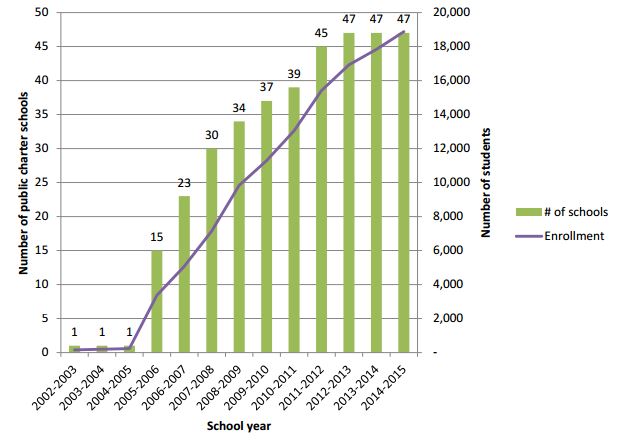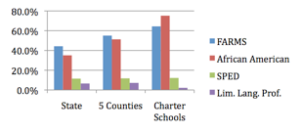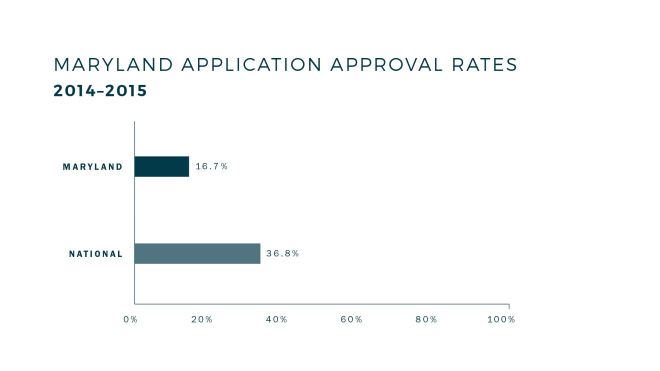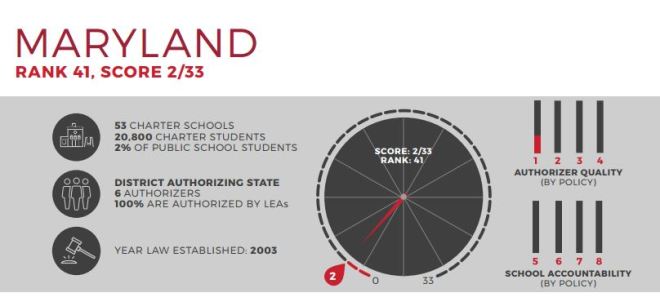Public Charter Schools have the potential to improve our education of elementary and secondary school students. I’ve learned this from my work the last eight years facilitating more effective financial management of these schools. It is disappointing, therefore, that Maryland/Howard County has made so little commitment to Public Charter Schools. It is equally troubling that there is not better understanding of what charter schools are.
I have found that the agencies operating Charter Schools, like the nonprofit world in general, range from ineffective but well-intentioned, to cutting edge and well-managed. The former schools need to be closed by the authorizer. The latter need to be replicated for the good of all our kids. But there are real obstacles to charter schools achieving their potential in Maryland. Here’s a primer on what Charter Schools are all about.
What are Public Charter Schools?
Charter schools are unique public schools that are allowed the freedom to be more innovative while being held accountable for advancing student achievement. Because they are public schools, they are:
- Open to all children;
- Do not charge tuition; and
- Do not have special entrance requirements.
The core of the charter school model is the belief that public schools should be held accountable for student learning. In exchange for this accountability, school leaders should be given freedom to do whatever it takes to help students achieve and should share what works with the broader public school system so that all students benefit.
 http://www.publiccharters.org/get-the-facts/public-charter-schools/
http://www.publiccharters.org/get-the-facts/public-charter-schools/
How are Schools Chartered in Maryland?
Maryland charter schools are public schools operated by an independent nonprofit organization. The charter is awarded by the local board of education (the “authorizer”), and grants the school more operational autonomy than non-charter public schools. Public charter schools are tuition-free and open to all students. The Maryland State Department of Education provides support and guidance to local school systems engaged in authorizing public charter schools, and to charter school operators.
 http://www.marylandpublicschools.org/programs/Pages/Charter-Schools/index.aspx
http://www.marylandpublicschools.org/programs/Pages/Charter-Schools/index.aspx
What’s the Status of Charter Schools in Maryland?
There are 50 Public Charter Schools in the State of Maryland.
- Baltimore City is home to 34 public charter schools.
- Prince George’s County has 10 charter schools
- Frederick county has 3 public charter schools
- Anne Arundel county has 2 public charter schools
- St. Mary’s county has 1 public charter school
If Maryland public charter schools became a school district, it would be 16th largest out of 24 public school districts in the state based on enrollment.

Charter School Employees are Unionized
Charter school teaching staff and the principal, are required by Maryland State Law to be employees of the local school district and not the charter operator. As such, they are subject to the collective bargaining contracts negotiated by the local school district with the appropriate unions and covered by all applicable state and local policies and regulations including certification.
Maryland law requires local school districts to fund public charter schools at a level commensurate with traditional public schools. Two key principles apply:
- Public school funds follow the student. Charter school students should get the same amount allocated to them as traditional school students.
- Commensurate funding currently applies only to operating funds, often called the “per-pupil” allocation, and has not included any separate allocation related to capital spending or otherwise allocated to pay for and maintain facilities.
Students of Maryland Charter Schools Reflect State Demographics
Public charter schools are public schools and their students reflect the demographics of the state of Maryland. Public charter schools serve students from all ethnic and socio-economic backgrounds as well as students with special needs.

In general, Maryland public charters schools enroll a higher percentage of African American student and serve more students who are FARMS eligible and those who require special education services.
 http://www.marylandcharterschools.org/charter/quick-facts
http://www.marylandcharterschools.org/charter/quick-facts
Standards for Quality Authorizing:
Charter school authorizers—over 1,000 nationwide—are as diverse as the public schools in their portfolios. Some authorize only one or two schools, while others have hundreds of schools in their purview, serving tens of thousands of students. The profession includes school districts, independent statewide boards, universities, not-for-profits, state education agencies, and other non-educational government entities.
A quality authorizer engages in responsible oversight of charter schools by ensuring that schools have both the autonomy to which they are entitled and the public accountability for which they are responsible. The following three responsibilities lie at the heart of the authorizing endeavor, and authorizers should be guided by and fulfill these Core Principles in all aspects of their work:
- Maintain high standards for schools
- Uphold school autonomy
- Protect student and public interests
What are Some of the Issues Faced by New and Existing Maryland Charters?
In 2013, the Maryland legislature asked that a series of issues related to public charter schools be studied. The Schaefer Center for Public Policy of the University of Baltimore was tasked by the Maryland State Department of Education with investigating these questions. This report details the findings and specifies the recommendations of the Schaefer Center’s research team.
First, if the legislature decides that the current system shows enough promise to be sustained but not enough to be expanded, then it should consider actions that will:
- Adjust the lottery requirement to allow for exceptions that accommodate educationally disadvantaged students; or to permit a geographic or regional weight;
- Provide more clarity about what constitutes “commensurate” funding;
- Promulgate information about innovations in charter schools and in other schools by fostering research and publicizing that research, including allowing some researchers access to individual student level data;
- Systematize the statewide collection, storage, and analysis of important charter school related information;
- Provide more clarity about the terms and conditions of performance contracts, time limits, and waiver policies; and
- Provide additional technical assistance for new charter school applicants.

Second, if the legislature agrees with the conclusion of this report that the current system shows enough promise to be expanded, then it should also consider actions, that would:
- Create a state level Independent Chartering Board (ICB) that would be an additional, active statewide authorizer of charter schools;
- Institute a time-limited subsidy to the LEA that partially subsidizes the per pupil cost of a new student entering a charter school; and
- Create a state or local addition to the per pupil allotment of a charter school student to compensate for the facilities expenses that the charter school’s existence relieves the state and locality from providing.
http://marylandpublicschools.org/programs/Documents/Charter-Schools/CharterSchoolReport12172014.pdf
Howard County BOE Policy Statement (July 1, 2016)
The Board of Education of Howard County is committed to maintaining an educational system that delivers exemplary curriculum and instruction as well as rigorous and innovative programs. The Board of Education of Howard County recognizes that public charter schools may be established in Howard County as an alternative means of providing innovative learning opportunities and creative educational approaches to enhance the education of students.
Public Charter School – A public school that is created in accordance with state laws and regulations, operates under a charter, and is under the supervision of and is accountable to the Board of Education of Howard County. It:
- Is nonsectarian in all its programs, policies, and operations.
- Is a school to which parents choose to send their children.
- Focuses on improving student performance through a specific set of educational objectives.
- Maintains high academic standards consistent with Howard County Public School System (HCPSS) expectations for academic achievement.
- Is innovative.
- Is a new public school or a converted existing public school.
- Provides a program of elementary and/or secondary education.
- Is tuition-free for all students who are eligible to attend any other Howard County public school tuition-free.
- Is subject to federal and state laws, including those prohibiting discrimination.
- Is in compliance with all applicable health and safety laws.
- Requires students to be physically present on school premises for a period of time substantially similar to that which other HCPSS students spend on school premises.





The NLRB has ruled that Charter schools are NOT public schools. They are private schools that take public money (taxes), thus limiting the amount of funds used for public schools. Charter schools are NOT held accountable to the local school boards, therefore no financial oversight. Charter schools “cherry pick” students to raise their testing outcomes. Charter schools force feed a curriculum (Common core garbage) of rote test prep in Math and ELA because the end all of their endeavor is a good score on the Big Standarized Test that is meaningless and useless. Charter schools staff their classrooms with non-union, TFA teachers that have no experience (except a 5 wk course) teaching and will likely leave after their 2 year commitment. Charter schools are funded by large corporations or wealthy donors who know nothing about education practice, but everything about making money.
I could keep on going Mr. Schwarz. Just in the past month or so, the stories that are surfacing over the corrupt nature of numerous charter schools nation wide is absolutely appalling. We don’t need a charter school in HoCo….we need the Superintendent to be fired and the BoEd to do what it was elected to do for students. HoCo needs to fund and build a vocational school for those students not interested in “college and career” readiness.
LikeLike
Thank you, Lisa M., for your comment. Of course, there are isolated examples among charter schools of some of the abuses you describe. In fact there are many great charter schools throughout the country, operated by exceptional educators and reputable nonprofit organizations. I’ve seen both kinds of schools first hand.
Howard County needs charter schools precisely because some children are not well served by their neighborhood public school. Why wouldn’t we welcome a skilled nonprofit organization to establish a voc-tech school, or one that specializes in serving other special needs students?
In my perspective, where there’s money to be had, there are always going to be some unscrupulous people that pursue the dollar for personal gain to the detriment of the children. After all, we live in a capitalist economy. With effective oversight, and determination to revoke a charter when a school is underperforming, bad apples can be eliminated and children can be allowed to benefit from the best charter schools can offer.
LikeLiked by 1 person